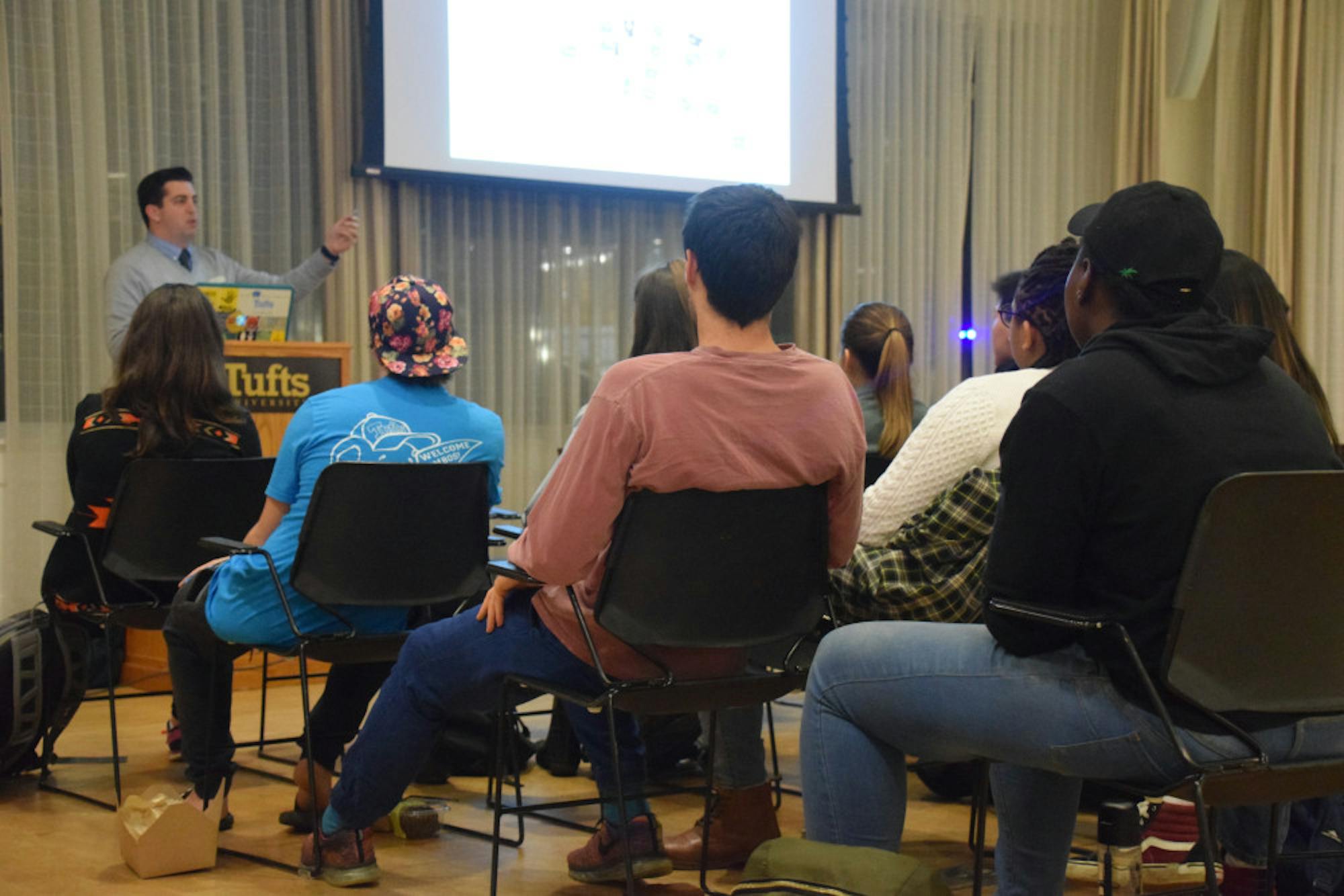Tufts Community Union (TCU) Senate held a town hall on Monday night to discuss plans for the upcoming Capen Village, a cluster of houses owned by Tufts that will be available as housing options for juniors and seniors starting next fall. The Brown & Blueprint Initiative, a series of listening sessions to help Senate learn more about spacial inequalities, was also slated to be discussed; however, there were so many questions around Capen Village that the initiative was not talked about.
The meeting included a panel of four people: TCU President Benya Kraus, Associate Director of Housing Operations Matt Austin, co-director of Tufts Energy Group Marianne Ray and Director of Campus Planning Lois Stanley. According to Stanley, construction of Capen Village, which will likely include themed housing, will be completed in three phases, the first of which will start in January or February of 2018.
Capen Village will consist of 15 houses located between Wren Hall and Boston Avenue; 13 of these houses currently exist, and two will be built as a part of the Capen Village construction plan, Stanley said. When construction is completed, there will be 145 single-occupancy bedrooms available, with each house having one full bath per floor, she added.
Each house will be comprised of apartments, the smallest of which can house three students and the largest of which can hold ten, Stanley said. Furthermore, each apartment will have a renovated kitchen, but there will be no parking available to students, either on the street or in the garages. There will, however, be bike parking.
According to Austin, the houses will not be separated by class year, but will instead integrate juniors and seniors throughout the various houses.
The project also allows for Tufts to control the rising rents that many students face when signing leases for off-campus housing, Kraus said in an Oct. 15 TCU Senate meeting where the project was discussed.
Construction on the first phase of Capen Village will begin this upcoming winter; by the fall of 2018, 45 bedrooms will be available for upperclassmen housing, according to Stanley. There will also be a common backyard for students living in these houses, which could be used in many ways, such as gardening or sports, she said.
The Tufts administration is considering implementing the idea of themed housing in Capen Village, according to Kraus. Kraus adopted the idea of themed housing from Whitworth University. She said the themes would likely change every year to incorporate a changing social environment and would be selected through a student-pitch process. According to Kraus, the themes would be part of a larger attempt to give back to the community; the houses would hold campus-wide events and attempt to diversify the social space at Tufts.
Kraus stressed that “themed housing is different than identity-based housing” and that Capen Village would not replace housing options for marginalized students in the Tufts community.
Students and administrators involved in this project are also working to make Capen Village environmentally friendly, Ray, a senior, said. Some of these sustainable features could be triple-pane windows and solar panels.
“We want to bring in a sustainable aspect to this village,” Ray said.
Ray also mentioned the possibility of using the eco-friendly component of Capen Village to offer classes and seminars on sustainability and to advance research opportunities, including measuring the use of energy over time. According to Ray, Capen Village will also test different sustainability technologies, depending on how much funding the project receives.
“The purpose is to broaden the curriculum that Tufts has with regards to climate change and sustainable development,” Ray said. “This would allow Tufts students to become leaders in climate mitigation and sustainability.”
In the space that will become Capen Village, there were previously four houses inhabited by faculty, two by staff, and three served as administrative units, according to Stanley. The people living in these houses were given notice last spring to find alternatives for housing and were given assistance in doing so if needed, according to Stanley.
Tufts is “working with Medford [officials] right now,” to address issues of accessibility, Stanley said, as many of the streets in the area are very steep and pose potential problems.
Some students at the town hall raised questions and concerns about the amount of autonomy students who live in Capen Village will have, or whether the houses will be co-inhabited by an authority figure. Austin responded to these concerns, noting that Tufts will hire additional graduate resident directors to live in the houses. These residents will not share rooms with any Tufts students, but rather will likely live in the basement to help facilitate themes and solve any housing problems.
The discussion revolving around Capen Village is still in the works, according to Kraus.
“We are totally open to feedback and definitely want more student involvement in this,” Austin said.
TCU town hall discusses developments on Capen Village

TCU Senate holds a town hall on equitable social spaces and the new Capen Village. The forum is pictured here on Oct. 30, 2017





